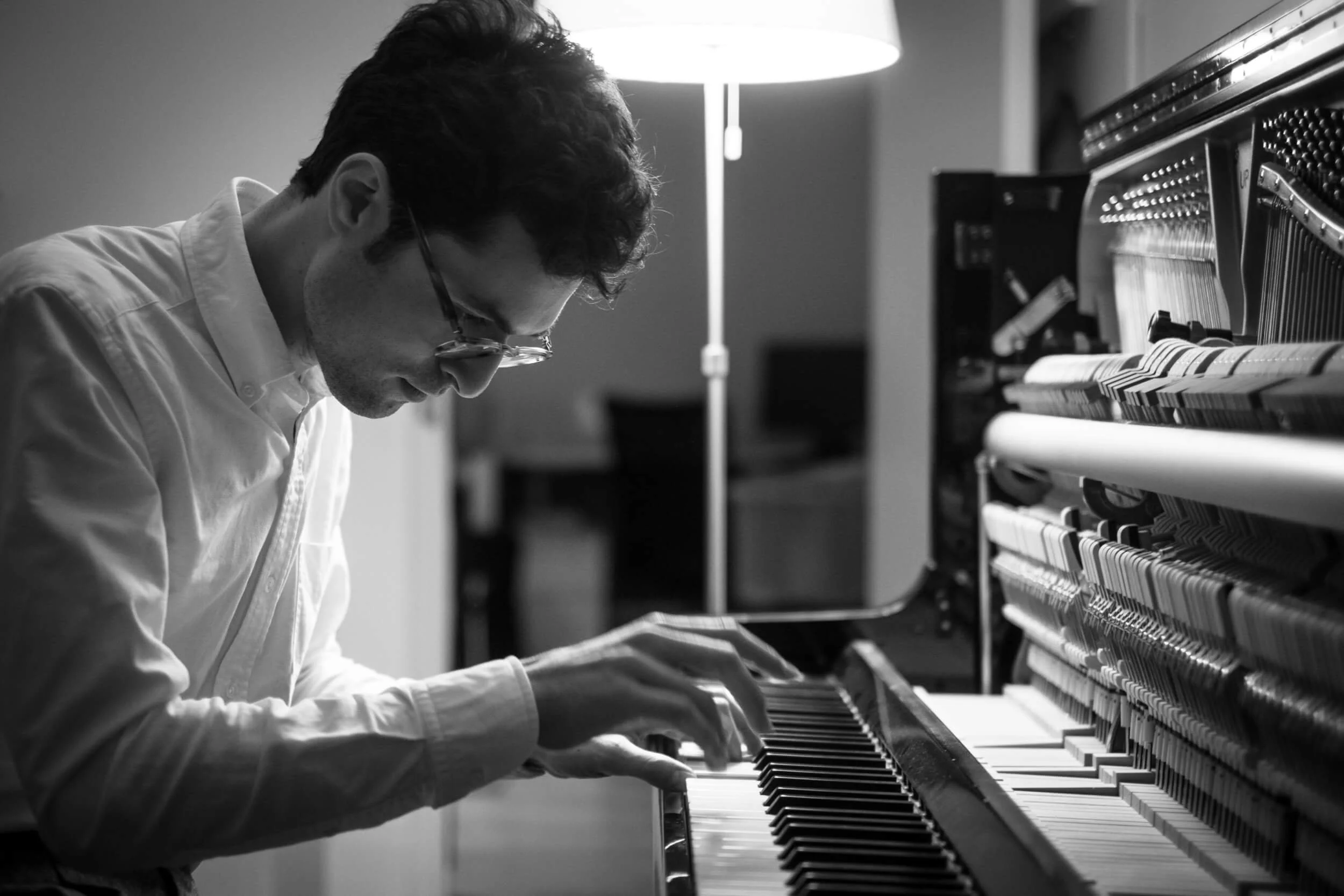Pianist Timo Andres blends Ellington with an array of American classical pieces, at Music on Main
Aaron Copland, Philip Glass, and other works sit easily with “Duke”’s, as as Month of Tuesdays launches
Timo Andres. Photo by Michael Wilson
Music on Main’s A Month of Tuesdays series presents Timo Andres at the Fox Cabaret on February 13 at 7:30 pm
IT’S HARD TO BELIEVE, given that we are almost a quarter of the way through the 21st century, but it’s only now that one of the major composers of the 20th is beginning to be given his due on the classical concert stage.
The composer in question is a legend, spawned several different schools of musical thought, trained or influenced literally hundreds of important musicians, received dozens of accolades including the Presidential Medal of Freedom and the French Legion of Honour, and is still held in awe by millions.
Yet his music is hardly ever heard in concerts of classical or contemporary new music—and given that we’re talking about Edward Kennedy “Duke” Ellington, it’s fair to draw the obvious conclusion.
Lucky for us, then, that the American pianist Timo Andres is colour-blind when it comes to choosing his repertoire, and equally unconcerned with stylistic or genre barriers. In his upcoming Music on Main recital, Andres will play three Ellington compositions—The Single Petal of a Rose, Reflections in D, and Prelude to a Kiss—next to works by Robin Holcomb, Aaron Copland, Fredric Rzewski, Gabriella Smith, and Philip Glass, and as far as he’s concerned there’s no reason why he shouldn’t.
“Getting to the point where we can do this, and where it is a widely accepted aesthetic stance to take, has been a long journey,” Andres admits, in a telephone conversation from his Brooklyn home. But the point of his program, he stresses, is not to address an historical inequity, but to demonstrate that no matter how different these composers might seem on the surface, they have been talking to each other, artistically speaking, for decades.
“I don’t how much, like, Ellington was listening to Aaron Copland’s music, but I certainly know Copland was listening to Ellington!” he adds.
“I don’t intend this as a radical gesture,” Andres continues. “In fact, I think if I’m saying anything, what I’m saying is that Ellington is one of the foundational figures of American music. And, to me, Ellington’s music has that same element of being in conversation with many, many, many different things. It’s intensely eclectic, mercurial… There’s a kind of inquiry at the heart of it, where you always feel that with each different piece or each different album or each different concert, he’s trying something new, trying a new perspective on the music that he’s inherited and that he’s come into contact with. Those are always the composers who I’m most interested in: the ones who take a wide-angle view, rather than the ones where it’s like ‘Okay, you can tell everything that this music is influenced by is from this one particular aesthetic tradition.’ That, to me, ends up being a kind of airless art.”
More on his mind when programming his current recital program, Andres suggests, was that all of the composers he’s selected are American.
“That’s quite intentional,” he explains. “I have always felt myself very strongly to be in a particular American tradition of music—and of American classical music in particular, with its complex and touch-and-go relationship to popular music and jazz from the very beginning. The identity of what we think of as an American school of composition, such as it is, has had a real Catholicism of influences, and that’s what has made me feel like I want to be a part of it. I feel that my music has always been—and I try to keep it this way as much as I can—a kind of porous substrate through which anything can leave a trace.”
Beyond that, Andres says, his program doesn’t advance any specific thesis—but it does hew to a kind of circular logic, especially given the last-minute addition of a new work of his own, Fiddlehead.
“It’s a short and energetic piece,” he notes. “It has almost a perpetual-motion kind of ebullience to it. The running figurations of it are all these curlicues, spirals, and vortex-shaped patterns that kind of repeat and develop and range all over the keyboard, in a somewhat organic way. And I think it is a piece that is a little bit about growing, about an idea taking form from something very elemental, from the bare minimum of an idea, and then growing up very quickly into something else.”
In short, Fiddlehead should make the perfect introduction for a recital that will work through Holcomb’s enigmatic Wherein Lies the Good, Copland’s expansive Piano Sonata, the three Ellington studies, and the hammering rhythms of Smith’s Imaginary Pancake and Rzewski’s Winnsboro Cotton Mill Blues before concluding with Glass’s Etude No. 20, the last in the 87-year-old minimalist’s magnificent series of short works for solo piano.
“Philip describes it as ‘kind of getting up and walking out the door,’” Andres says. “It’s a valedictory kind of a piece, but in a very meditative and philosophical and I would say almost metaphysical kind of a mood.”
If that’s also how we feel upon exiting the Fox Cabaret next Tuesday, the composer-pianist will have done his job to perfection.













